A Guide On How To Take Care Of Your Dog After Birth


Mother’s Day is just around the corner, and it is time to honor and celebrate all the strong, incredible women in our lives. But this year, let’s extend the celebration to another special member of our family – our beloved female dog, who recently gave birth to her puppies. Giving birth is not an easy feat for anyone, be it dogs or humans, so she deserves all the pampering and care she can get.
Also, she may walk on four paws, but she is just as amazing a mother as any other human mom and deserves just as much love and attention. So, this Mother’s Day, why not show some extra love and attention to our furry best friend who just became a new dog momma?
In this guide, we will explore how to care for your new dog mom so that she has a smooth recovery and make sure that her pups are also doing well. We will also talk about ways to spoil her and celebrate the miracle of motherhood she’s just experienced.
Understanding The Postpartum Stage In Female Dogs

Watching a litter of adorable puppies being born is one of the most exciting and memorable moments for any pet parent. But at the same time, you need to remember that it is a delicate time for your female dog, and just like human mothers, dog moms also require proper postpartum care after giving birth.
Providing her with proper care and attention during this stage is essential not only for her health and well-being but also for her newborn puppies. However, this crucial period of recovery is often overlooked.
If your female dog is giving birth at home, then it is your responsibility to provide her with the best postpartum care possible. To do so, here are some things that you need to know about post-natal care in female dogs:
Duration And Stages Of Postpartum Period in Female Dogs
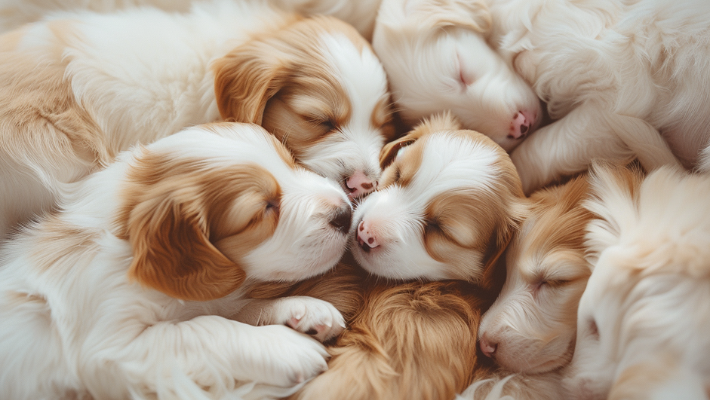
The postpartum period, also known as the “puerperium,” refers to the first 6-8 weeks after a female dog gives birth. It is during this time that the mother’s body undergoes significant changes as it recovers from the physical and emotional toll of pregnancy and delivery.
The postpartum period is divided into three stages: immediate postpartum, early postpartum, and late postpartum. Each stage requires different levels of care and attention from the owner, and it is crucial to understand these stages to provide the best care for your dog.
Common Postpartum Complications in Dogs
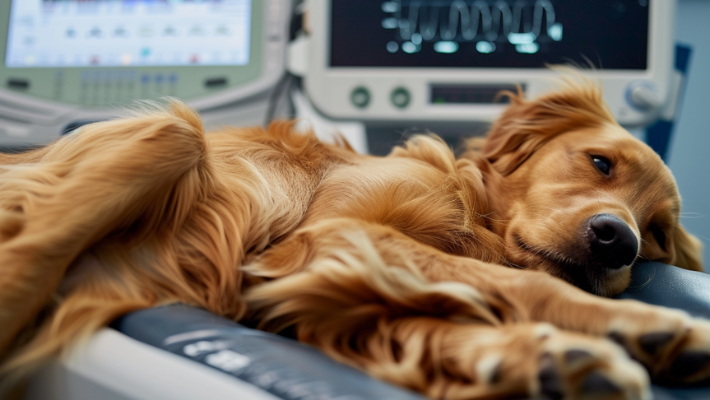
While most postpartum periods progress smoothly, it’s crucial to be aware of potential complications that may arise. Recognizing the signs and symptoms early can help you take prompt action and seek veterinary assistance if necessary. Here are some common postpartum complications to watch out for:
- Postpartum Hemorrhage: Excessive bleeding after giving birth can be a serious issue. While some light bleeding is normal, heavy or prolonged bleeding may indicate a retained placenta or other complications.
- Metritis: This is an infection of the uterus that can occur after whelping. Symptoms may include fever, lethargy, loss of appetite, and foul-smelling vaginal discharge.
- Mastitis: Inflammation or infection of the mammary glands can cause swelling, redness, and pain in the breasts. Your dog may also exhibit signs of fever and reduced milk production.
- Eclampsia: Also known as milk fever, this condition is caused by a sudden drop in calcium levels and can lead to muscle tremors, restlessness, and even seizures.
- Postpartum Depression: While less common, some mother dogs may exhibit signs of depression, such as lethargy, loss of appetite, and lack of interest in caring for their puppies.
If you notice any of these signs or other concerning symptoms, it’s essential to contact your veterinarian immediately. Prompt treatment can help prevent further complications and ensure a smooth recovery for your dog.
Now that you know about the duration of the postpartum period in dogs and the common complications that can arise, let’s move on to discuss how to pamper and care for your female dogs.
How To Care For Your Female Dog
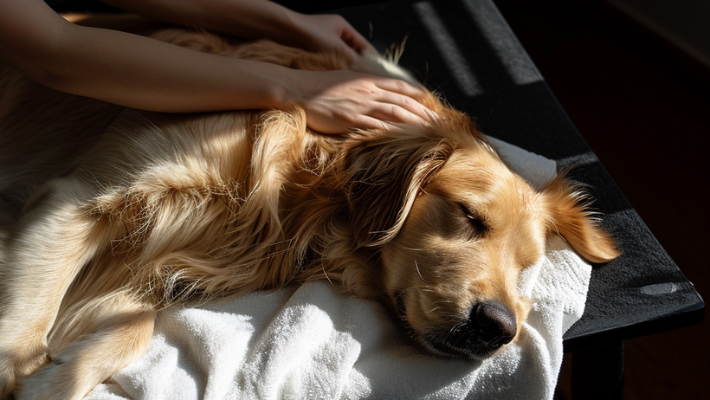
Postpartum care encompasses a range of factors, including monitoring your dog’s health, ensuring adequate nutrition, providing a calm and comfortable environment, and addressing any potential complications that may arise. We have discussed these factors in detail below. and since mother’s day is just around the corner, we have added some tips on how to pamper your new dog mom.
Creating a Calm Environment
Creating a peaceful and stress-free environment for your postpartum dog is crucial for her well-being and the health of her puppies. During this time, your dog is likely to feel more vulnerable and may experience heightened anxiety or protective instincts. By providing a calm and quiet space, you can help reduce her stress levels and promote a positive postpartum experience.
Here are some tips for creating a serene environment for your postpartum dog:
- Set up a dedicated whelping area or nursery that is quiet, warm, and away from high-traffic areas of your home.
- Limit visitors and excessive noise or activity near the whelping area to minimize disturbances.
- Ensure the area is well-ventilated and maintained at a comfortable temperature for the mother and her puppies.
- Provide soft bedding, such as blankets or towels, that can be easily cleaned or replaced as needed.
- Consider using pheromone diffusers or calming supplements (with your veterinarian’s approval) to help reduce stress and anxiety.
Remember, your postpartum dog may be more protective of her litter, so it’s essential to respect her space and avoid disturbing her unnecessarily. By creating a peaceful environment, you can help your dog feel secure and focused on caring for her puppies.
If you have a female dog at home who gave birth a few weeks ago, then you will notice her puppies are now growing less dependent on her for food and other necessities. Your dog is also spending more time away from them. For Mother’s day, you can consider providing her with a quiet space in another corner of the house.Here she can relax and spend some time on her own and can be away from litter for a bit.
Prepare Nourishing Meals
Proper nutrition is crucial for your postpartum dog’s recovery and her ability to produce high-quality milk for her puppies. During this time, your dog’s nutritional needs increase significantly, and providing her with a well-balanced, nutrient-rich diet is essential for maintaining her health and supporting the growth and development of her litter.
Here are some important considerations for feeding your postpartum dog:
- Increase Caloric Intake: Your dog’s energy requirements will be higher during lactation, so it’s essential to increase her caloric intake by 25-50% compared to her pre-pregnancy diet. This can be achieved by feeding a high-quality puppy or lactation formula or by adding nutrient-dense supplements to her regular diet.
- Provide High-Quality Protein: Protein is essential for milk production and the growth of the puppies. Choose a diet that is rich in animal-based proteins, such as chicken, beef, or fish.
- Ensure Adequate Hydration: Nursing dogs require a higher water intake to support milk production. Ensure that your dog has access to fresh, clean water at all times and encourage her to drink frequently.
- Consider Supplementation: Depending on your dog’s specific needs, your veterinarian may recommend additional supplements, such as calcium, omega-3 fatty acids, or probiotics, to support her overall health and milk quality.
- Feed Multiple Small Meals: Rather than offering one or two large meals, it’s often better to provide smaller, more frequent meals throughout the day to support your dog’s increased energy needs and prevent digestive issues.
Remember, every dog is different, and their nutritional requirements may vary based on their breed, size, and the number of puppies in the litter. Consult with your veterinarian to develop a customized feeding plan that meets your postpartum dog’s specific needs.
For mother’s day, you can consider baking her some of her favorite home made treats. But if she is still nursing, then make sure to ask your vet beforehand and verify that the ingredients are safe for the puppies.
You can also give her puppy-safe treats like Bone broth popsicles and frozen treats using yogurt and fruits safe for dogs. Another thing you can do is upgrade her dinner and include her favorite food like cooked chicken, beef or salmon into her food bowl.
Creating a Clean And Hygienic Environment For Mother Dog And Puppies
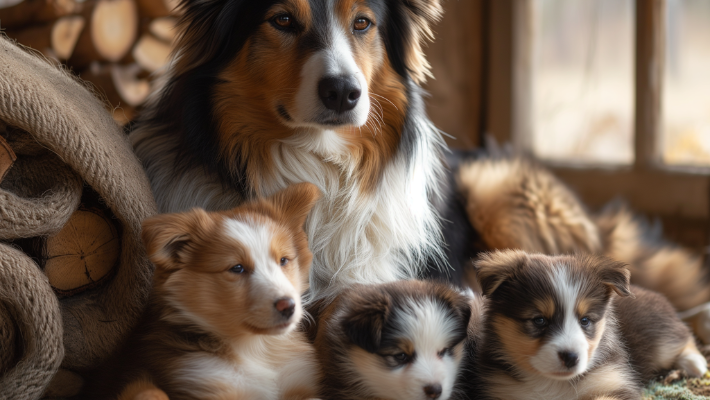
Maintaining proper hygiene and cleanliness is crucial for the health and well-being of your postpartum dog and her puppies. During this time, your dog’s immune system may be compromised, and her puppies are particularly vulnerable to infections and illnesses.
By following good hygiene practices, you can help reduce the risk of potential health issues and create a clean and comfortable environment for your furry family.
Here are some important hygiene practices you can follow for a clean and comfortable environment for your postpartum dog and her litter:
- Clean the Whelping Area Regularly: Puppies can create a lot of mess, so it’s essential to clean the whelping area frequently. Use a mild, pet-safe disinfectant to sanitize the bedding, floors, and surfaces. Ensure the area is thoroughly dried before allowing your dog and her puppies back in.
- Groom Your Dog Regularly: Brushing your dog’s coat and trimming her nails can help maintain her overall cleanliness and prevent the spread of dirt or debris to her puppies. Be gentle and avoid stressing her during grooming sessions. If you want to pamper her for mother’s day, then plan a DIY spa day at home. Brush her fur gently,
- Bathe Your Dog When Necessary: It’s generally not recommended to bathe your dog immediately after giving birth. Instead you can use a soft towel and warm water to clean her gently. Be extra gentle when you are cleaning around her mammary glands.
You need to give her a gentle bath if she becomes excessively soiled or develops an unpleasant odor. Use a mild, pet-safe shampoo and ensure she is completely dry before returning her to her puppies. Or if you want to pamper her for mother’s day, you can also give her a oatmeal bath which will soothe her and help her feel relaxed.
- Follow up with a massage: Once your dog is mostly dry, give them a gentle massage using your fingers. Focus on their shoulders, neck, back, and legs, using gentle circular motions. Avoid their belly unless they really enjoy it.
- Clean Feeding and Water Bowls: Regularly wash and disinfect your dog’s food and water bowls to prevent the buildup of bacteria or contaminants that could make her or her puppies sick.
- Monitor for Signs of Infection: Keep a close eye on your dog and her puppies for any signs of infection, such as discharge, foul odors, or excessive licking or scratching. If you notice any concerning symptoms, contact your veterinarian immediately.
By maintaining a high level of cleanliness, you can minimize the risk of potential health issues and ensure a comfortable postpartum experience for the new dog mom.
Monitoring The Health Of The Mother And Puppies
During the postpartum period, it’s essential to closely monitor your dog’s health and well-being to ensure a smooth recovery and identify any potential issues early on. Regular check-ups with your veterinarian and attentive observation at home can help you catch and address any concerns promptly.
Here are some key areas to focus on when monitoring your postpartum dog:
- Physical Appearance and Behavior: Observe your dog’s overall appearance, energy levels, and behavior. Look for signs of lethargy, loss of appetite, or any unusual changes that may indicate an underlying issue.
- Vaginal Discharge: Some light bleeding or discharge is normal after giving birth, but excessive or foul-smelling discharge can be a sign of infection or other complications. Monitor the amount and appearance of any discharge.
- Milk Production and Nursing: Ensure your dog is producing sufficient milk for her puppies and that they are nursing effectively. If you notice any issues with milk production or the puppies’ weight gain, consult your veterinarian.
- Mammary Gland Health: Regularly check your dog’s mammary glands for signs of swelling, redness, or tenderness, which could indicate mastitis or other issues.
- Temperature and Vital Signs: Monitor your dog’s temperature, heart rate, and respiratory rate regularly. Elevated or abnormal vital signs can be an early indicator of potential health concerns.
- Appetite and Water Intake: Pay attention to your dog’s appetite and water intake, as changes in these areas can signal underlying issues or dehydration.
It’s also important to keep a record of your dog’s postpartum progress, including any changes or concerns you observe. This information can be valuable for your veterinarian in assessing your dog’s health and making appropriate recommendations.
Remember, early detection and prompt treatment are key to addressing any postpartum complications. If you notice any concerning signs or have any doubts, don’t hesitate to contact your veterinarian for guidance and advice.
Paying A Visit To The Vet
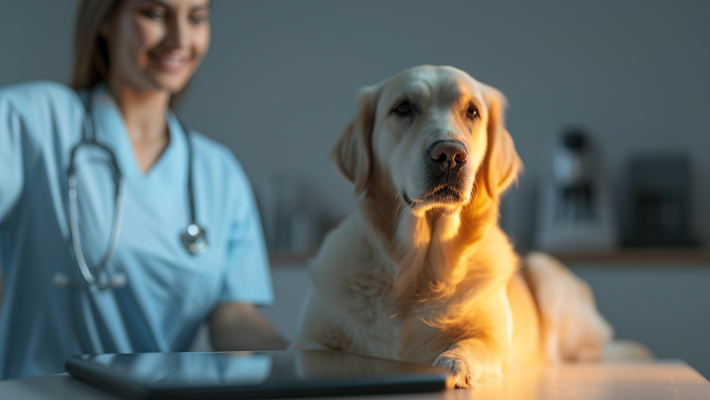
While most postpartum periods progress smoothly, there may be instances when seeking veterinary assistance is necessary to ensure the health and well-being of your dog and her puppies. Recognizing the signs and symptoms that warrant professional intervention is crucial for a successful recovery and to address any potential complications promptly.
Here are some situations when you should seek veterinary assistance during the postpartum period:
- Excessive Bleeding: If your dog experiences heavy or prolonged vaginal bleeding after giving birth, it could indicate a retained placenta, uterine tear, or other serious complications. Seek immediate veterinary care.
- Fever or Lethargy: A fever or signs of lethargy in your postpartum dog may indicate an infection or other underlying health issue. Your veterinarian can evaluate the situation and provide appropriate treatment.
- Loss of Appetite or Dehydration: If your dog is not eating or drinking adequately, it could lead to dehydration and other complications. Prompt veterinary attention is recommended to address the underlying cause and ensure proper hydration and nutrition.
- Difficulty Nursing or Milk Production Issues: If your dog is struggling to nurse her puppies or experiencing issues with milk production, it’s important to seek professional guidance. Your veterinarian can assess the situation and provide recommendations for supplemental feeding or addressing any underlying issues.
- Abnormal Vaginal Discharge: While some light discharge is normal after giving birth, excessive or foul-smelling discharge can indicate an infection or other complications. Consult your veterinarian for proper evaluation and treatment.
- Mastitis (Mammary Gland Infection): If you notice swollen, red, or painful mammary glands, your dog may be suffering from mastitis. Prompt veterinary treatment is necessary to prevent further complications and ensure proper milk production.
- Eclampsia (Milk Fever): This condition, characterized by muscle tremors, restlessness, and seizures, requires immediate veterinary intervention. Your veterinarian can provide calcium supplementation and other necessary treatments to stabilize your dog’s condition.
- Prolonged Constipation or Straining: While some constipation is expected after giving birth, prolonged or severe cases may require veterinary attention to address the underlying cause and provide relief.
Remember, seeking veterinary assistance promptly can help prevent further complications and ensure the best possible outcome for your postpartum dog and her puppies. Trust your instincts and don’t hesitate to reach out to your veterinarian if you have any concerns or doubts about your dog’s health or well-being during this critical period.
Wrapping Up
Giving birth and becoming a mother can be an overwhelming experience for even our dogs. But by prioritizing your new momma dog’s health and well-being with proper care, pampering, and a little extra TLC, you can ensure she thrives during this special time.
Remember, a happy and healthy momma dog leads to happy and healthy puppies. So shower her with love, prioritize her needs, and enjoy the beautiful process of watching your new furry family grow and bond. Happy Mother’s Day to all the amazing dog moms out there!
ADDITIONAL READING:









Leave A Comment